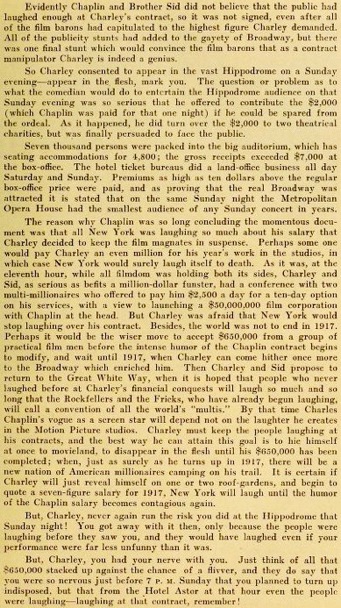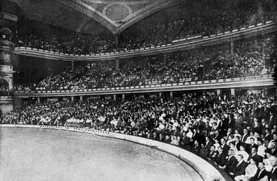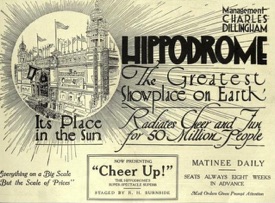Charlie Chaplin´s Burlesque on Carmen next previous
Burlesque on Carmen Clippings 66/101
Robert Grau, Motion Picture, New York, May 1916.
Management Charles Dillingham, Hippodrome, The Greatest Showplace on Earth Now Presenting Cheer Up! exterior, New York, 1917, postcard
& Hippodrome, auditorium, New York, undated
„Salary“
Editorial content. „The More the People Laughed
at the Idea of Chaplin´s Salary, the More They Had to Pay
By Robert Grau
Theaterdom, which in modern times includes
the movies, still regards the recent exploits of Charles Chaplin
as a gigantic hoax.
The idea that the funniest man in all the world, who
only very recently was appearing in the flesh on the vaudeville
stage at a weekly salary of $100, is to receive now
a weekly pay of $13,500 is so funny that Broadway refuses
to accept the proposition seriously.
But it is an absolute truth not only that this is to be
his weekly wage for the next twelve months but that ever since
Chaplin arrived in New York in a deliberate plan
to bankrupt the nation, the comedian‘s figure has mounted
with such an impetus that there were substantiated
rumors afloat of danger to his life, in that not all of the Motion
Picture magnates who were willing to pay the extraordinary
price could get him.
And these magnates were prepared to pay that price
to keep him from signing with rivals. The dangerous
position of Charley probably accounts for his serious attitude
in negotiating. Not one professional out of twenty
believes that Charles Chaplin is paid $650,000 for his comedy
work on the screen in 1916. While as for the layman,
Chaplin is regarded by him as a great joke. The truth is that
Charles Chaplin could have been signed up for a new
contract at a weekly salary of $1,500 almost any day before
he conceived the plan of paying a visit to Broadway.
It is also true that Chaplin was not accepted with alacrity at
$1,500 a week, so Charley concluded to have a look
at Broadway. That trip to the theatrical Rialto was personally
conducted by the screen comedian‘s oldest brother,
Sidney, who manipulated the cards so well that it is not only
true that Charley is paid $650,000 for one year, but
practically every one of six of filmdom‘s mightiest magnates
was prepared to pay him the same. At no time did
Charley‘s honorarium decline. Why? Because all filmdom
was laughing itself to the bursting point, not at
Chaplin‘s antics, not even at the sight of the real Chaplin
appearing on the Hippodrome stage – they were
laughing at the truly funny spectacle of a screen star, two years
ago hardly known by name, including a half-dozen sane
film barons to pay him more money per week (and every week
of the fifty-two in the year) than was ever meted out
to Edwin Booth, Patti, Caruso and Paderewski in a job lot, and
the more the people laughed, the more serious became
Charley and Brother Sid.
You see it was like this:
Filmdom‘s great funster was not known even by sight
to the people of Broadway. Chaplin was so little known when
he reached the Great White Way that he was mistaken
for everybody but Chaplin. The Chaplin of the screen looks not
a bit like the modest, gentlemanly and serious-minded
man who turned up at midnight on the roof-garden of the
New Amsterdam.
Right then started the tremendous evolution
in the Chaplin salary. When the New York Herald published
an illustrated interview with Charley the people
laughed more then ever. On that day the largest figure
quoted as the comedian‘s salary was about
one-fourth the sum finally paid. It was the publicity
given to Charley‘s rapidly expanding monetary
value, which created the most astonishing theatrical contract
in the world‘s history.
Evidently Chaplin and Brother Sid did not believe
that the public had laughed enough at Charley‘s
contract, so it was not signed, even after all of the film
barons had capitulated to the highest figure
Charley demanded. All of the publicity stunts had added
to the gayety of Broadway, but there was one final
stunt which would convince the film barons that as a contract
manipulator Charley is indeed a genius.
So Charley consented to appear in the vast Hippodrome
on a Sunday evening – appear in the flesh, mark you.
The question or problem as to what the comedian would do to
entertain the Hippodrome audience on that Sunday
evening was so serious that he offered to contribute the $2,000
(which Chaplin was paid for that one night) if he could
be spared from the ordeal. As it happened, he did turn over
the $2,000 to two theatrical charities, but was finally
persuaded to face the public.
Seven thousand persons were packed into
the big auditorium, which has seating accommodations for
4,800; the gross receipts exceeded $7,000 at the
box office. The hotel ticket bureaus did a land-office business
all day Saturday and Sunday. Premiums as high
as ten dollars above the regular box-office price were paid,
and as proving that the real Broadway was attracted
it is stated that on the same Sunday night the Metropolitan
Opera House had the smallest audience of any
Sunday concert in years.
The reason why Chaplin was so long concluding
the momentous document was that all New York was laughing
so much about his salary that Charley decided to keep
the film magnates in suspense. Perhaps some one would pay
Charley an even million for his year‘s work in the
studios, in which case New York would surely laugh itself
to death. As it was. at the eleventh hour, while all
filmdom was holding both its sides, Charley and Sid, as serious
as befits a million-dollar funster, had a conference
with two multi-millionaires who offered to pay him $2,500
a day for a ten-day option on his services, with
a view to launching a $50,000,000 film corporation with
Chaplin at the head. But Charley was afraid that
New York would stop laughing over his contract. Besides,
the world was not to end in 1917. Perhaps it would
be the wiser move to accept $650,000 from a group of practical
film men before the intense humor of the Chaplin contract
begins to modify, and wait until 1917, when Charley can come
hither once more to the Broadway which enriched him.
Then Charley and Sid propose to return to the Great White Way,
when it is hoped that people who never laughed before
at Charley‘s financial conquests will laugh so much and so long
that the Rockfellers and the Fricks, who have already
begun laughing, will call a convention of all the world‘s ,multis.‘
By that time Charles Chaplin‘s vogue as a screen star
will depend not on the laughter he creates in the Motion Picture
studios. Charley must keep the people laughing at his
contracts, and the best way he can attain this goal is to hie
himself at once to movieland, to disappear in the flesh
until his $650,000 has been completed; when, just as surely
as he turns up in 1917, there will be a new nation
of American millionaires camping on his trail. It is certain
if Charley will just reveal himself on one or two
roof-gardens, and begin to quote a seven-figure salary
for 1917, New York will laugh until the humor
of the Chaplin salary becomes contagious again.
But, Charley, never again run the risk you did at the
Hippodrome that Sunday night! You got away with it then, only
because the people were laughing before they saw you,
and they would have laughed even if your performance were
far less unfunny than it was.
But, Charley, you had your nerve with you. Just think
of all that $650,000 stacked up against the chance of a flivver,
and they do say that you were so nervous just before
7 P. M. Sunday that you planned to turn up indisposed, but that
from the Hotel Astor at that hour even the people
were laughing – laughing at that contract, remember!“
Hippodrome, 6th Avenue, 43rd and 44th Street, New York.
Redaktioneller Inhalt
Charlie Chaplin´s Burlesque on Carmen next previous



